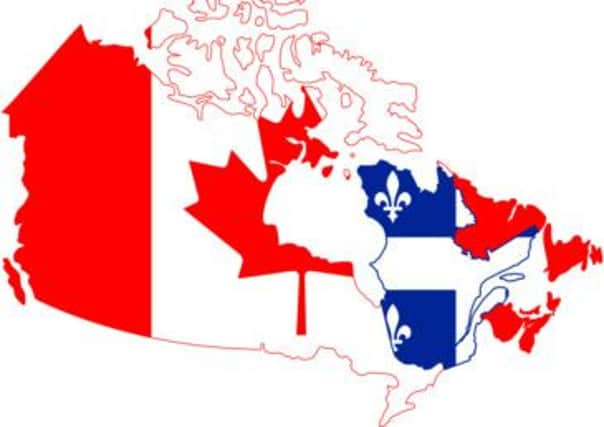Jane Bradley: Lessons of the Québec indyref


I’d lived there for a while as a child and in 1995 – just a few weeks before a referendum was due to be held which would decide whether the province of Québec should become an independent state – I’d returned to spend the summer with friends, just in time to see the indyref campaign in full swing.
In the end, Québec opted to remain part of Canada – but only just. With the No campaign winning a nailbiting 50.56 per cent of the vote, half of the citizens were obviously none too happy with the outcome.
Advertisement
Hide AdAdvertisement
Hide AdUnlike in Scotland, however, in Québec, which way a person was likely to vote was fairly – but not always – obvious from the minute they opened their mouths. Many French-speaking Québecois wanted to separate; most English Canadians did not – that’s a generalisation of course.
I moved to Québec with my family in 1992, when my dad took a job there. The following year brought a Canadian federal election when, for the first time, the independence movement, Bloc Québecois, won sufficient votes to become the official opposition party in Canada – the first and only time this has been achieved by a separatist party.
In the months ahead of the election – the outcome of which led to the referendum two years later – were the first signs of tension over what would ultimately happen to the region.
Living in Montreal – where just over half of the population speak French at home and fewer than 20 per cent count English as their primary language – not speaking French as a default, or not at least being willing to speak French, was the equivalent of waving a St George’s cross while walking down Sauchiehall Street.
The “language police” (a bona fide government organisation, although that is not its technical name) ensures that French does not get sidelined. In fact, the Québecois have a legal right to be served in French, if they should so choose.
In 1992, a flower shop in our very English Canadian suburb was reprimanded when it failed to follow the rules stating that the “florist” sign should be printed only two-thirds the size of the adjacent French “floriste” board.
My poor mum, who had a historic O-level in the language and hadn’t used it since school, learned a set phrase meaning something along the lines of “We’re British – from Britain. Not English Canadian! I’m very sorry for my bad French!” which she employed every time we entered a shop, so as to avoid the glares from the assistants when they realised we couldn’t speak their native language properly.
A French Canadian friend gets angry when she finds someone unwilling to converse with her in what should be the default language of Québec. A bakery assistant who once told her “I prefer to speak English” in response to her French order got the sharp end of her tongue.
Advertisement
Hide AdAdvertisement
Hide AdPost-referendum, however, most Québecois seem content to let sleeping dogs lie. In the past 19 years, there has been little appetite for resurrecting the independence debate. That’s not to say it hasn’t been discussed – just earlier this year, the idea of a third referendum (the first was a resounding “No” in the 1980s) put forward by separatist politicians from the Parti Québecois was quashed when the group was ousted from power in a province-wide election by the Liberal opposition.
However, a few English Canadian friends from Montreal – all of whom are bilingual – tell me they have felt uncomfortable in their home province since the referendum. Some, on reaching adulthood, have moved to another part of the country, where the English language is in the majority, despite feeling they will always regard Québec as their home.
Although they are definitely in the minority, this is sad. A referendum is the way to gauge public opinion – a democratic means of sorting out the viewpoint of the majority. Once that public opinion has been stated, everyone should accept it.
Ultimately, no matter what your gut feeling – and whether Scotland becomes independent or not – what everyone should be united in is wanting a happy, peaceful and positive-thinking country, post indyref.
Let’s make sure we make it happen.